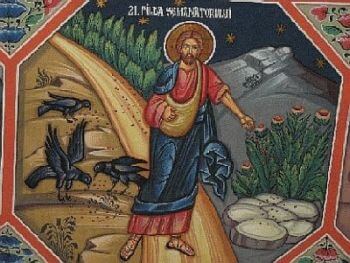
Whenever I post to social media, I find myself hitting “refresh” on my browser within a minute, at most. Has anyone commented on it? Do they “like” it? Are they trying to share it? For hours afterwards, I’ll obsessively try to quantify how much my words have touched others, how quickly I am reaffirmed. Even if I suspect this obsession is common, I’m not proud of it, especially when it spreads to my craving immediate feedback for these very posts.
Of course, God’s timeframe is different than our mortal one. And Jesus tried to use different means and parables throughout his ministry to get that point across. But we seldom listen. Shortly after Jesus ascended to Heaven, folks were sure that Christ was coming back any day now. Obviously, that hasn’t panned out on a human timeframe, but we have to assume that things are moving exactly as God would have them, in the big picture.
Today’s readings deal with time, in a way. The parable of the sower — in the Gospel selection from Mark — is one I imagine just about everyone has heard, and I’ve heard (and written about) various insights relating to it. But today I’m struck at the notion of spreading seed, of the time involved.
I mean, you’re a farmer. You plant some seed. And then . . . you wait. In ideal circumstances, with really spritely seeds, you might just wait a day or two. Otherwise, you might wait months before you know for sure if a seed took hold. It can take years before a tree can be well-and-truly healthy enough to thrive on its own, before a forester can tell how successful any planting efforts were.
So, too, is it with the Word of God. You plant the seed, and then you wait. You can do all you can to ensure a healthy environment for the seeds you sow, but — at the end of the day — it’s God who determines if the seed takes root or not.
The other readings today have to deal with the priesthood, from a notice how “every priest stands daily at his ministry” to a Responsorial Psalm that proclaims “You are a priest for ever, in the line of Melchizedek.” Reflecting on our own priesthood, we see the appreciation for time, for waiting and allowing seeds to grow.
Some faiths allow anyone to start preaching the word as soon as they feel inspired, but our Church requires priests to spend years becoming highly trained and knowledgable. Some belief systems say you can be forgiven whenever you feel like it, while we know the truth behind the Sacrament of Reconciliation, which requires time, effort, and deliberation.
The world has only gotten faster: the desire to speed up relationships, the want of children to grow up as fast as possible, the promise of all answers at our fingertips. But this desire has been with humanity from the beginning, tempting with shortcuts of knowledge in the Garden, seducing with fratricide when one proved jealous of a brother’s favor with God, eliciting jeers shouted at the crucified Lord to prove His divinity and save Himself.
In all cases, that rift can be healed and a new life with God is possible. But miracles occur when God wants them to happen, which isn’t necessarily when we might demand them. Yes, sometimes God’s blessings are as immediate as the parting of the Red Sea, but sometimes it’s a three-day wait like the resurrection, or a wait of months like the Flood . . . or even the waiting of centuries between the longing for a Savior and His birth.
In your own life, I would encourage you to reflect on a time when you felt God’s presence, or felt the answer to your prayers, where was a surprising gulf between when you first felt that need and when you felt the prayer answered. Consider the blessing of that in-between time; we know that God hears all our prayers, and we have faith that He will provide for our needs, but that time between the two is when we can really get closer to Him.
Do your part. Sow the seed. Do God’s will. Pray. And then be prepared to wait while God does His part . . . on his time.
